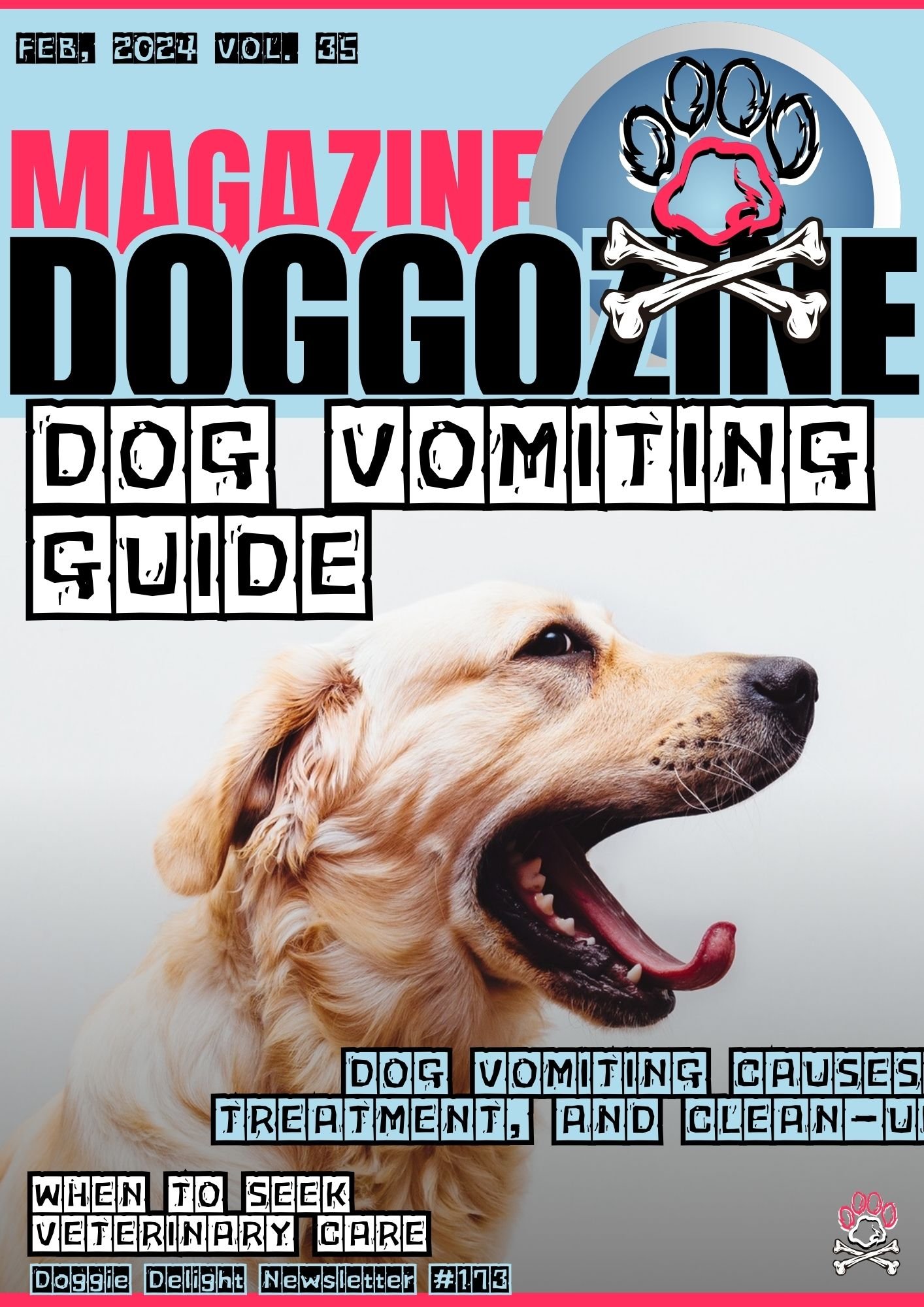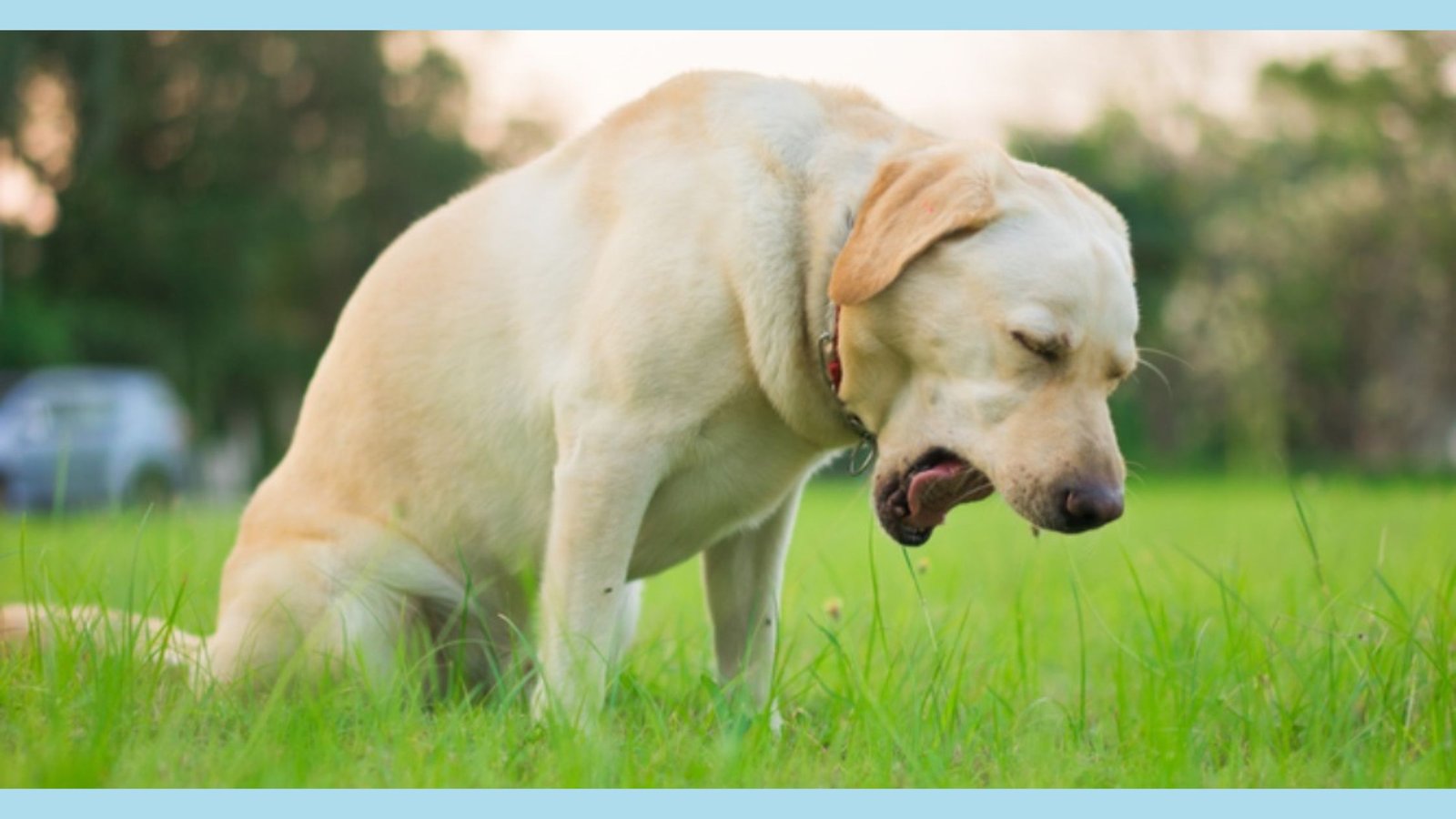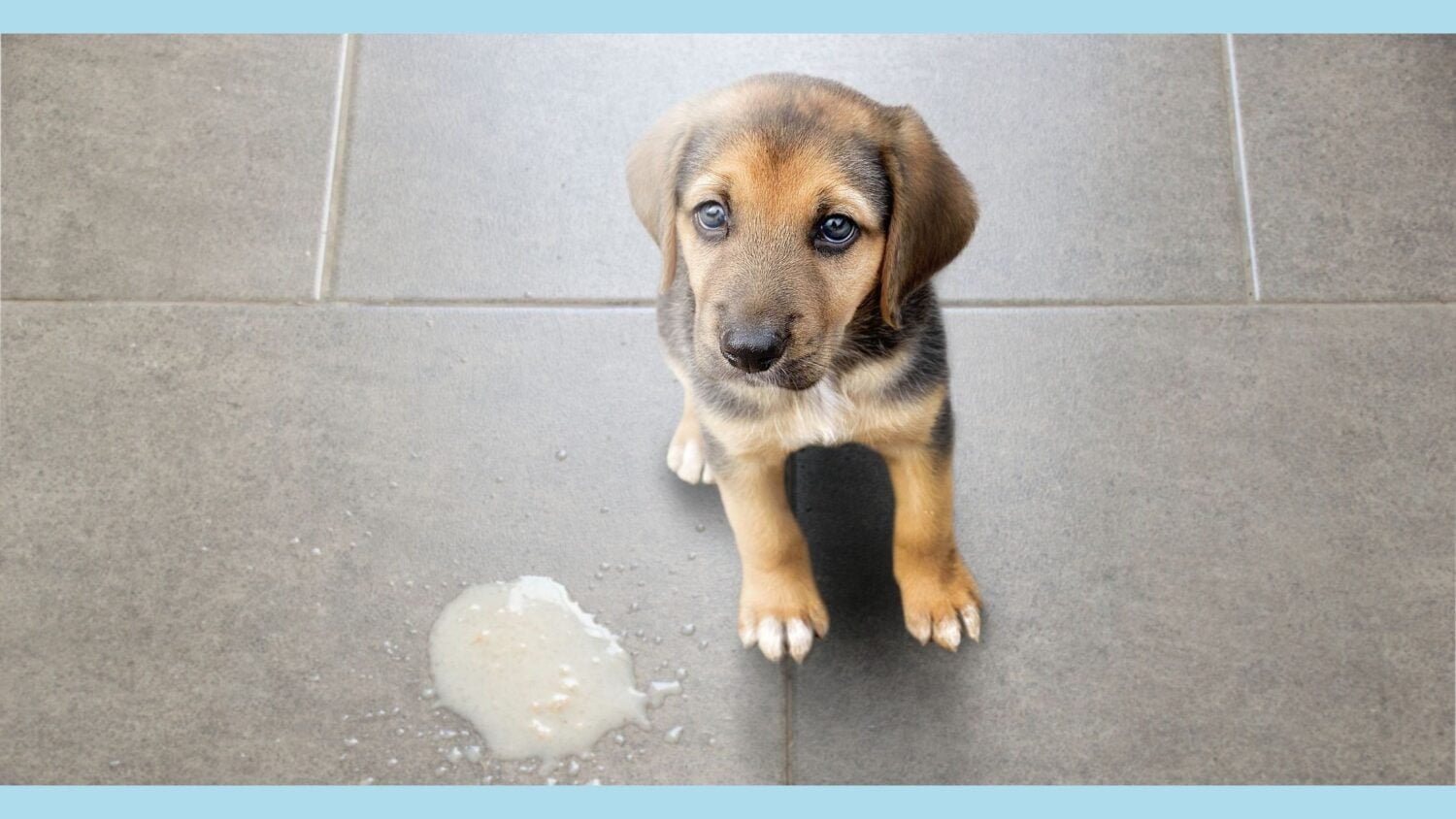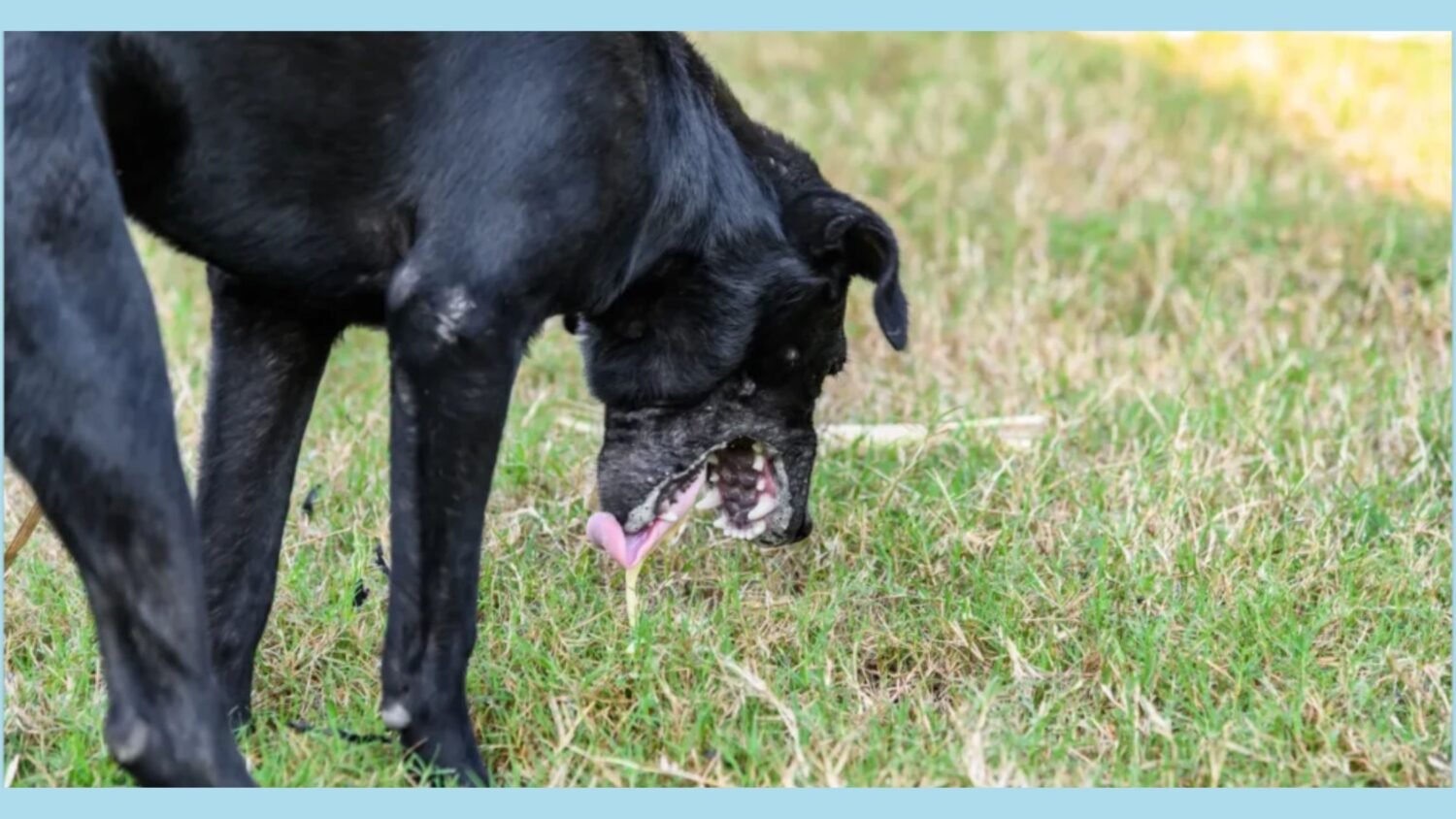
DOG VOMITING CAUSES, TREATMENT, AND CLEAN-UP
As a responsible dog owner, it can be concerning when your dog starts vomiting frequently. While occasional vomiting may not be a cause for alarm, frequent episodes can be a sign of an underlying issue that requires attention. In this article, we will explore the possible reasons behind your dog’s vomiting, how to provide immediate care, and how to clean up afterwards.
COMMON CAUSES OF DOG VOMITING
Vomiting in dogs can be caused by various factors, ranging from minor to more serious conditions.
Some common causes include:
Understanding Dietary Indiscretion in Dogs
One of the most common reasons for dogs to vomit is dietary indiscretion. This occurs when dogs consume something that doesn’t agree with their stomach, such as spoiled food, garbage, or a sudden change in diet. In most cases, the vomiting is a temporary reaction, and the dog will recover on their own.
All dogs are known for their unstoppable curious nature and tendency to explore their surroundings with their mouths. While this can be endearing, it can also lead to them ingesting things that are not meant for consumption. This is especially true when it comes to the dog food.
Dietary indiscretion refers to the act of a dog consuming something that is not a part of their regular diet. This can include anything from table scraps and spoiled food to garbage and foreign objects. Dogs have a strong sense of smell and are often attracted to the scent of food, even if it is not suitable for them.
Keep Track of the Dog’s Diet
One situation dogs face is eating from the trash or spoiled food. Bacteria and toxins in spoiled food can upset the dog’s stomach, causing vomiting. Similarly, if a dog swallows a plastic toy or clothing, it can block their digestive system, leading to vomiting.
Another cause of vomiting is a sudden diet change. Dogs have sensitive stomachs. Switching their food brand or type abruptly can disturb their digestion, causing vomiting.
Dog owners must be careful about what their pets can access. They should keep garbage cans closed, avoid leaving food out, and supervise outdoor play to prevent ingesting foreign objects.
If a dog eats something they shouldn’t and vomits, monitor them. Usually, the vomiting will stop on its own, and the dog will recover. However, if vomiting lasts over 24 hours, or the dog has diarrhea, lethargy, or can’t keep food/water down, seek veterinary care immediately.
Dog Vomiting Prevention and Treatment
If a dog eats something it shouldn’t, the vet will check them and may do tests like blood work or imaging. Treatment could involve anti-nausea meds or fluids if symptoms are bad.
Preventing dogs from eating things they shouldn’t is important. Be careful what they can access and feed them a consistent, balanced diet. Introduce diet changes slowly so their stomach can adjust.
In summary, dogs vomit when they eat spoiled food, garbage, or change diets too quickly. Most cases get better alone, but see a vet if vomiting continues or other issues happen. Consistency and prevention keep dogs’ stomachs healthy.

DOG’S GASTROINTESTINAL UPSET
Dog vomiting can also happen from gastrointestinal issues like gastritis or gastroenteritis. These can come from infections, food allergies, or eating irritating stuff. If vomiting happens with diarrhea, no appetite, or lethargy, see a vet for diagnosis and treatment.
What is an Upset Doggy Tummy?
An upset tummy or belly is a common problem for pups. It’s when their digestive system isn’t feeling well. This includes tummy aches and other issues with their gut. Dogs with an upset stomach might throw up, have diarrhea, not want to eat much, or feel really tired.
What Causes a Dog’s Tummy Troubles?
A few different things can upset a doggy’s tummy. These include:
- Bugs: Bacteria, viruses, or parasites can inflame their digestive system. This could make them vomit.
- Food Allergies: Some pups have allergies to ingredients in their food. This makes their belly unhappy.
- Eating Weird Stuff: Dogs love exploring with their mouths! Sometimes they swallow things they shouldn’t, like plants or chemicals. Yucky stuff like that can really mess up their tummy.
Signs of an Upset Stomach and Dog Vomiting
Throwing up is a common sign a pup’s belly is bothered. But a little vomiting isn’t always serious. Dogs toss their cookies sometimes just from eating too fast or getting into something that didn’t agree with them.
But if your furry friend won’t stop throwing up, has diarrhea too, isn’t hungry, or seems sluggish, that’s a red flag. Those other yucky symptoms mean there’s likely a bigger issue going on that needs medical care.
Understanding and Managing Tummy Troubles and Dog Vomiting
If your pup is dealing with an upset stomach, your vet will do a full check-up. They might also recommend tests, like blood work, poop analysis, or X-rays to find the root cause. These help figure out what’s going on.
The treatment will depend on what’s causing the tummy troubles. For infections, your vet could give antibiotics or anti-parasite meds. With food allergies, they may suggest a special diet to avoid the problem ingredient. Easy stuff.
If your dog ate something yucky, the vet might make them vomit or flush their stomach. They could also provide meds to soothe nausea or diarrhea. Just depends on the situation.
Preventing Pup’s Potty Problems
It’s not always possible to avoid tummy troubles, but you can help reduce the chances. Here’s how:
- Feed a balanced doggy diet made for pups. No table scraps or problem foods! Simple and healthy.
- Keep an eye on your curious doggo. Don’t let them eat stuff they shouldn’t, like chemicals or toys.
- Introduce new foods slowly over time. This gives their belly a chance to get used to it.
- Dogs sometimes get a tummy ache. This can happen for various reasons. Keeping your pup’s vaccines up-to-date is important. Vaccines shield them from certain illnesses that upset their stomach and guts.
- Good hygiene matters too. Wash your hands properly after cleaning up your dog’s potty. Keep their living space tidy. This helps stop infections that could make them feel icky.
It’s normal for dogs to throw up now and then. But constant vomiting, diarrhea, no appetite or acting sluggish means you should take them to the vet. Understanding what causes tummy troubles and spotting the signs early allows you to keep your pup’s digestive system in good shape and avoid them getting an upset belly.

WHEN DOGS EAT STUFF THEY SHOULDN’T
Dogs are curious little critters. Sometimes they swallow objects that can get stuck in their gut. Things like toys, socks or small household items. If you think your dog ate something they shouldn’t have, get them to the vet right away. This could be a life-threatening emergency.
Dogs Eating Foreign Objects: Causes, Signs, and Treatment
Let’s be real, dogs are super inquisitive. Their curious nature often leads them to explore their surroundings by sniffing and tasting things. Sometimes they accidentally swallow objects they shouldn’t. While it seems harmless initially, eating foreign objects can rapidly become serious and even life-threatening for our furry buddies. Here, we’ll explore what causes dogs to ingest foreign bodies, signs to watch for, and treatment options.
Causes of Foreign Object Ingestion
There are several reasons why dogs may ingest foreign objects. One common cause is their natural tendency to explore the world through their mouths. Puppies, in particular, are notorious for chewing on anything they can find. Additionally, dogs may ingest objects out of boredom, anxiety, or as a result of a medical condition known as pica, where they have an abnormal appetite for non-food items.
Common examples of foreign objects that dogs may ingest include toys, socks, rocks, sticks, clothing, and small household items. These objects can vary in size, shape, and material, making it important for dog owners to be vigilant and keep potentially dangerous objects out of their pet’s reach.
Symptoms of Foreign Object Ingestion
Identifying the symptoms of foreign object ingestion is crucial for early intervention and treatment. While the signs may vary depending on the size, location, and type of object ingested, some common symptoms include:
- Vomiting
- Loss of appetite
- Abdominal pain or discomfort
- Lethargy
- Diarrhea
- Constipation
- Difficulty or straining during defecation
- Bloody stools
- Excessive drooling
- Coughing or gagging
- Difficulty breathing
If you notice any of these symptoms or suspect that your dog may have ingested a foreign object, it is crucial to seek immediate veterinary care. Delaying treatment can lead to complications such as intestinal blockages, perforations, or even sepsis.
Diagnosis and Treatment of Dog Vomiting
If your dog swallows something it shouldn’t, the vet will examine them carefully. They might need tests like X-rays or ultrasounds to find where the object is. The treatment depends on what was swallowed and where it is. Sometimes the object can pass naturally. But if it’s stuck or causing problems, surgery may be needed.
The vet might make a cut in your dog’s belly to remove the object. Or they might use a tiny camera to take it out another way. In severe cases, part of the intestines may need to be removed too. After removing the object, your vet may give medicine for pain, swelling, or infection. They might also suggest a special diet to help your dog recover.
Sometimes surgery is unavoidable. The vet will make a small cut to remove the stuck item. Cameras can also retrieve objects non-invasively. Removing intestines is rare but happens with severe blockages. Afterward, meds ease discomfort while dietary changes aid healing.
Preventing Foreign Object Ingestion
It’s better to stop your dog swallowing things than needing treatment. Here are some tips:
- Keep small objects like toys and socks out of reach.
- Watch your dog when playing and stop them chewing the wrong things.
- Give appropriate chew toys to prevent boredom and chewing behavior.
- Stop problems before they start. Dogs are curious so keeping tempting items away is wise. Supervising play avoids accidental ingestions. Providing correct chew outlets satisfies the urge safely.
- Keep trash cans tightly shut. Dogs can’t resist temptation if smelly treats are exposed.
- “Drop it” or “leave it” commands train dogs well. Teach these tricks to prevent ingesting bad stuff.
- Always check your dog’s area for dangers. Remove items they could swallow or chew on.
- Crate training helps when you can’t watch your dog. The crate keeps them safe and contained.
- These steps lower risks of your dog eating foreign objects. Safety comes first for your furry friend.
Dogs ingesting foreign objects is very serious. Know the causes, watch for signs, and get vet help fast. Avoid risks by blocking access to hazards, giving good toys and activities. Your dog’s health depends on your responsible pet parenting.

INTESTINAL WORMS IN DOGS
Vomiting in dogs sometimes stems from intestinal worms like roundworms or hookworms. Dogs can pick up these parasites from dirty soil, infected prey, or other animals. Regular deworming and good hygiene prevent worm-related vomiting.
The Impact of Intestinal Worms on Dogs
Dog owners worry about intestinal worms as they create health issues like vomiting. Roundworms and hookworms are especially bad for dogs’ digestive systems. This section explains causes, symptoms, and prevention for intestinal worms in dogs.
Causes of Intestinal Parasites in Dogs
Dogs can get intestinal parasites in many ways. Dirty soil is a common source of infection. Dogs may accidentally eat parasite eggs or larvae from the soil when licking their fur or playing outside. They can also get parasites from eating infected animals or having contact with other dogs with parasites.
Symptoms of Intestinal Parasites
Vomiting is a symptom of intestinal parasites in dogs. But vomiting can happen for other reasons too, so you should see a vet to find the real cause. Other signs of parasites include diarrhea, weight loss, poor appetite, coughing, and a dull coat.
Prevention and Treatment
Deworming your dog regularly is important to prevent and treat intestinal parasites. Puppies should start deworming at two weeks old and continue regularly until adulthood. Adult dogs also need deworming as advised by the vet. Good hygiene helps prevent the spread of parasites. Quickly clean up dog poop in the yard. Avoid dirty soil. Wash your hands after playing with dogs or being outdoors.
It is important to note that over-the-counter deworming medications may not be effective against all types of intestinal parasites. Therefore, it is best to consult a veterinarian to determine the most appropriate treatment for your dog. Veterinarians can perform fecal examinations to identify the specific type of parasite and prescribe the appropriate medication.
Practicing Good Hygiene is Crucial in Dog Vomiting Prevention
Intestinal parasites, such as roundworms and hookworms, can cause vomiting in dogs. These parasites are commonly contracted through contaminated soil, infected prey, or contact with other infected animals. Regular deworming and practicing good hygiene are crucial in preventing and controlling intestinal parasites.
If your dog exhibits symptoms of vomiting or other signs of gastrointestinal distress, it is important to consult a veterinarian for proper diagnosis and treatment. By taking proactive measures, you can help ensure the overall health and well-being of your furry companion.

DOG’S ORGAN DYSFUNCTION
In some cases, frequent vomiting can be a symptom of underlying organ dysfunction, such as kidney or liver disease. These conditions require prompt veterinary attention to diagnose and manage the underlying cause.
Understanding the Link Between Frequent Dog Vomiting and Organ Dysfunction
Vomiting is a common occurrence in both humans and animals. While occasional vomiting may not be a cause for concern, frequent vomiting can be a symptom of underlying organ dysfunction. In particular, kidney or liver disease can manifest through this gastrointestinal symptom. It is crucial to recognize the signs and seek prompt veterinary attention to diagnose and manage the underlying cause.
Why Your Dog is Vomiting: The Role of Kidneys and Liver
Your dog’s kidneys play a huge part in keeping them healthy. They filter out waste from the blood and balance key minerals. But when the kidneys don’t work right, toxins build up in the body. This can make your dog throw up often.
Diseases like chronic kidney problems or sudden kidney injury harm how the kidneys do their job. Then waste and toxins collect in the body instead of leaving. All those bad substances make your pup feel sick and vomit.
How the Liver Affects Dog Vomiting
The liver is another organ tied to dog vomiting when it’s not working well. The liver helps remove toxins, break down food, and make proteins the body needs. But liver diseases like hepatitis, scarring, or liver failure prevent it from doing these tasks properly.
When the liver can’t do its job right, toxins and other bad substances build up inside your dog. This overload leads to throwing up and other stomach issues.
Checking and Treating Organ Problems in Dogs
If your pup is throwing up a lot, take them to the vet. The vet will examine them carefully and might order tests to find out what’s going on. Solving the core organ issue often stops the vomiting too.
Health problems with organs can be serious for dogs. Tests help find the cause. Vets may check blood, urine, take images, or a sample from the organ. With the cause known, vets can treat the issue.
Treatment depends on what’s wrong and how bad it is. Meds may help relieve symptoms and improve organ function. For severe cases, the dog may need hospital care and support to get better.
Keeping Dog Organs Healthy
Some organ issues can’t be avoided. But you can promote organ health. Feed a balanced diet, give exercise, and clean water. These are important for overall health.
Regular vet visits can catch early signs of organ trouble. Routine tests give insights into organ function. Early action may be possible if needed.
Watch for frequent vomiting. It could mean kidney or liver disease. Acting quickly to get a diagnosis and treatment is key. Prioritizing your dog’s health helps keep organs working well and avoids complications.

WHEN TO SEE THE VET
Sometimes dogs throw up. But you need to see a vet right away if:
- Your dog keeps throwing up and can’t keep food or water down.
- The vomit has blood or looks like coffee grounds.
- Your dog also has diarrhea, seems tired, or has belly pain.
- You know your dog ate something toxic or a non-food item.
If you’re unsure, it’s best to check with your vet.
Helping Your Dog Right Away
If your dog is throwing up but seems okay otherwise, you can:
- Don’t give food for 12 hours to let the stomach settle.
- Make sure your dog has fresh water to drink.
- After 12 hours, try giving boiled chicken and rice.
- Watch your dog closely and see the vet if vomiting continues or gets worse.
Cleaning Up after Dog Vomiting
It’s important to clean up dog vomit to keep your home clean and healthy.
Here are the steps to clean it up properly:
- Wear disposable gloves to protect yourself from germs.
- First, get a paper towel. Gently wipe up any vomit you can see. Be careful not to spread it around.
- Next, mix some vinegar and water together. Use one part vinegar and two parts water.
- Get a clean cloth or sponge. Wet it with the vinegar solution. Blot the area where the vomit was. This will help remove any leftover mess.
- Rinse the area with clean water. Then, use a towel to dry it.
- Throw away any paper towels, cloths, or gloves you used. Put them in a sealed plastic bag. This stops germs from spreading.
- Don’t forget to wash your hands well with soap and water.
Some cleaning products, like ones with bleach or ammonia, can be dangerous for dogs. It’s best to use pet-safe cleaners.
A Quick Note About Dog Vomiting
If your dog keeps throwing up, it could be a problem. You’ll need to find out what’s causing it. Sometimes vomiting goes away on its own. But if it keeps happening or gets worse, talk to your vet. By understanding why dogs vomit, taking care of the mess safely, and keeping things clean, you can help your furry friend feel better.









